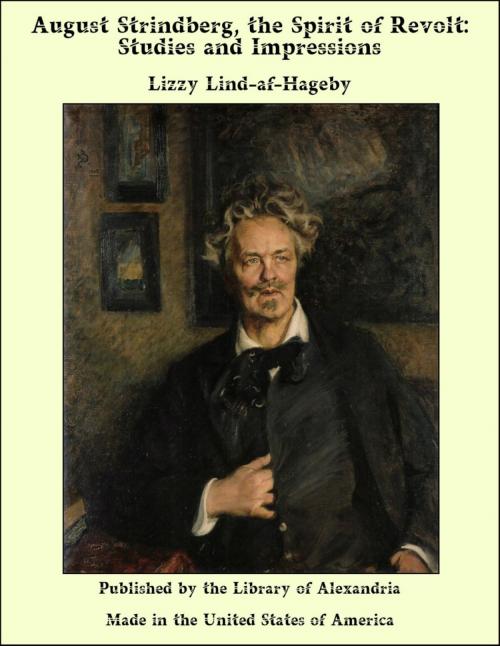August Strindberg, the Spirit of Revolt: Studies and Impressions
Nonfiction, Religion & Spirituality, New Age, History, Fiction & Literature| Author: | Lizzy Lind-af-Hageby | ISBN: | 9781465588883 |
| Publisher: | Library of Alexandria | Publication: | March 8, 2015 |
| Imprint: | Language: | English |
| Author: | Lizzy Lind-af-Hageby |
| ISBN: | 9781465588883 |
| Publisher: | Library of Alexandria |
| Publication: | March 8, 2015 |
| Imprint: | |
| Language: | English |
There have been few dispassionate attempts to discern August Strindberg's place in contemporary literature. His writings and his personality defied ordinary criticism. He took upon himself the rôle of destroyer, he mocked men's religion and men's morality, he ridiculed propriety and poured bitter scorn on the social order. There was something cometic in the swiftness and intensity with which he appeared, disturbing the well-ordered orbits of traditions and conventions. The erratic course of his voyage through humanity caused alarm. No sooner had people congratulated themselves that his terrific lust for destruction had passed by their favourite systems and their cherished ideals, than his ruthless force was upon them, exposing ugliness and scattering treasures. He passed on, making enemies, breaking idols, desecrating temples. He sowed reality and he reaped hatred. His titanic spirit worked through a brain charged with explosive mentality. He poured out dramas, novels, stories, with a versatility and an accumulating energy which in themselves were offensive to the mediocre and to those who sought to place him within literary shackles. He discoursed on history, science and statecraft with the calm assurance of omniscience. He wrote books which were decidedly and unblushingly "immoral." He compelled attention by blasphemous outbursts which filled the religious with righteous indignation and sighs for the auto-da-fé. He dissected the human heart, laid bare its meanness, its uncleanliness; made men and women turn on each other with sudden understanding and loathing, and walked away smiling at the evil he had wrought. He turned on himself with savage hatred, and in books, bearing the mark of the flagellant and reflecting the agony of a soul in torment, he pointed to his sins and his stripes.
There have been few dispassionate attempts to discern August Strindberg's place in contemporary literature. His writings and his personality defied ordinary criticism. He took upon himself the rôle of destroyer, he mocked men's religion and men's morality, he ridiculed propriety and poured bitter scorn on the social order. There was something cometic in the swiftness and intensity with which he appeared, disturbing the well-ordered orbits of traditions and conventions. The erratic course of his voyage through humanity caused alarm. No sooner had people congratulated themselves that his terrific lust for destruction had passed by their favourite systems and their cherished ideals, than his ruthless force was upon them, exposing ugliness and scattering treasures. He passed on, making enemies, breaking idols, desecrating temples. He sowed reality and he reaped hatred. His titanic spirit worked through a brain charged with explosive mentality. He poured out dramas, novels, stories, with a versatility and an accumulating energy which in themselves were offensive to the mediocre and to those who sought to place him within literary shackles. He discoursed on history, science and statecraft with the calm assurance of omniscience. He wrote books which were decidedly and unblushingly "immoral." He compelled attention by blasphemous outbursts which filled the religious with righteous indignation and sighs for the auto-da-fé. He dissected the human heart, laid bare its meanness, its uncleanliness; made men and women turn on each other with sudden understanding and loathing, and walked away smiling at the evil he had wrought. He turned on himself with savage hatred, and in books, bearing the mark of the flagellant and reflecting the agony of a soul in torment, he pointed to his sins and his stripes.















